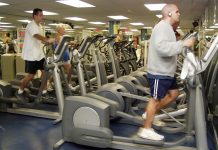
Moderate exercise by itself does not increase your appetite unless you have exercised too hard where you don’t have enough oxygen to carry on a conversation or are on a quick weight loss diet which has depleted your liver glycogen stores due to a low carbohydrate diet.
Glycogen is the stored form of blood glucose in your muscles and liver. You only have about 1500 calories of stored glycogen in your liver that can be mobilized for fuel when your blood sugar is low. Muscle glycogen is primarily used for muscle fuel when exercising. When glycogen is depleted, your body has to scavenge protein in muscles and organs to supply glucose. Depending on the time of your last meal before exercising, your blood sugar may be low. In which case, your body is telling you to eat when you feel hungry.
Moderate exercise helps in suppressing appetite and increasing your metabolic rate for up to 15 hours after exercise. A gland in your brain called the hypothalamus is responsible for secreting a hormone, which inhibits hunger. Exercise helps stimulate this gland to produce more of this hormone. Moderate exercise that would produce this beneficial effect would be 60 minutes of exercise, 3 to 5 times per week. Possibly, by the time you complete your exercising the suppression of your appetite has started or your blood sugar has rebounded.
One easy way to determine if you are exercising in your heart rate zone is – can you carry on a conversation? If not, then you are doing aerobic exercise which means that your body is not getting enough oxygen and can only use glucose for fuel of which there is a limited storage supply. On the other hand, if you can carry on a conversation, then oxygen can be delivered to fat cells to release fat for fuel. This can happen only after 20 minutes of aerobic exercise.



